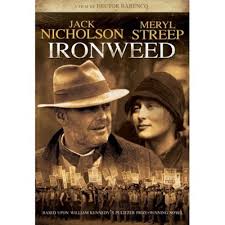Kennedy, William (1983). Ironweed. New York: Penguin, 225 pp.
This beautifully written novel is a character study of homeless alcoholics in Albany during the depression. Sounds depressing, but it isn’t, because the characters are so alive and interesting. Main character, Francis, was once a major league baseball player around 1910, back when there was no money in baseball. During a depression-era trolley strike, he killed a man and went on the lam, beginning his descent into alcohol. He eventually managed to pull together a life, got married and achieved stable lower class status, despite his drinking, until, while drunk, he accidentally dropped his baby, killing it. In shame, he ran away again and we pick up the story when, 20 years later, broke and homeless, he goes to the cemetery and apologizes to the baby’s grave.
Throughout the story, dead people from his past appear (in his imagination) and have conversations with him. That represents his ongoing effort to come to terms with the life he has made for himself. Francis the bum has a longtime girlfriend, Helen, also a bum who once studied piano at Vassar but descended into the bum’s life after her father died. The idea is that a fate like this could befall anyone; we are each a hair’s breadth from desolation.
In fact though, there are always other factors, not the least of which are the genetic components of temperament, addiction, mental illness, and other brain characteristics. You don’t just become alcoholic and homeless because you feel ashamed, or because your father died. Misfortunes happen to millions of people and they get past them somehow. I attribute bumhood to biological predispositions more than other factors, but that is a modern view not prevalent in the 1980’s when this was written.
This novel suggests that bums are noble savages, who, in poor economic times, were defeated by misfortune. They are noble because they are decent to each other and they take responsibility for the choices they have made, and continue to make. They don’t envy anyone, don’t blame anyone. They’re more fatalistic than unhappy being bums, despite the extremely hard life. Maybe we are supposed to learn that anyone can be a decent human being, even at the farthest margins of society. Basic humanity shines through circumstance.
Thematic considerations aside, the dialog is perfect, the humor is honest, and the characters are believable and likeable despite the incredible squalor of their situation. There is a touch of sentimentality I could have done without. The writing is beautiful, and overall, the story is memorable. This book, the third in a trilogy, won the Pulitzer Prize.

